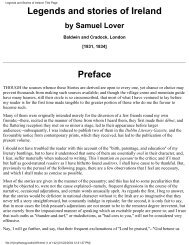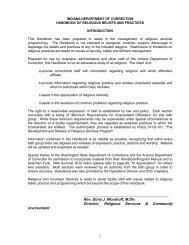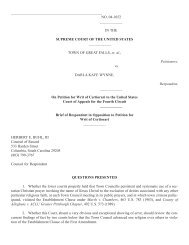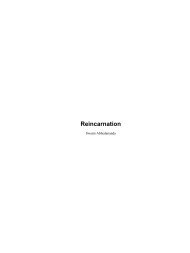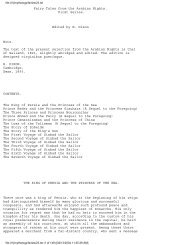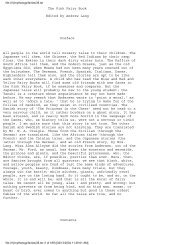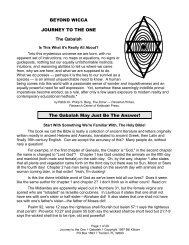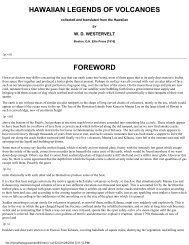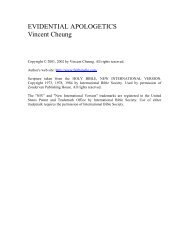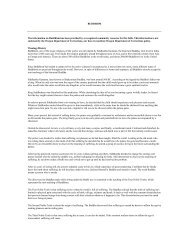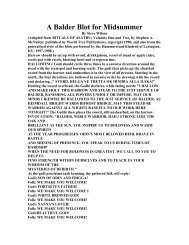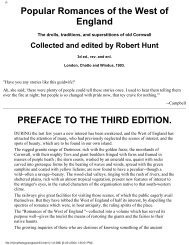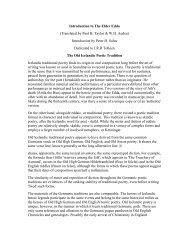You also want an ePaper? Increase the reach of your titles
YUMPU automatically turns print PDFs into web optimized ePapers that Google loves.
Undine, liebes Bildeben du,<br />
Seit ich zuerst aus alten Kunden<br />
Dein seltsam Leuchten aufgefunden,<br />
Wie sangst du oft mein Herz in Ruh!<br />
DE LA MOTTE FOUQUÉ.<br />
Chapter I<br />
Undine's Kymric Sisters<br />
THE chief object of this and several of the following chapters is to place on record all the matter I can find on the subject of Welsh lake<br />
legends: what I may have to say of them is merely by the way and sporadic, and I should feel well paid for my trouble if these<br />
contributions should stimulate others to communicate to the public bits of similar legends, which, possibly, still linger unrecorded among<br />
the mountains of Wales. For it should be clearly understood that all such things bear on the history of the Welsh, as the history of no<br />
people can be said to have been written so long as its superstitions and beliefs in past times have not been studied; and those who may<br />
think that the legends here recorded are childish and frivolous, may rest assured that they bear on questions which could not themselves be<br />
called either childish or frivolous. So, however silly a legend may be thought, let him who knows such a legend communicate it to<br />
somebody who will place it on record; he will then probably find that it has more meaning and interest than he had anticipated.<br />
p. 2<br />
I.<br />
I find it best to begin by reproducing a story which has already been placed on record: this appears desirable on account of its being the<br />
most complete of its kind, and the one with which shorter ones can most readily be compared. I allude to the legend of the Lady of Llyn y<br />
Fan Fach in Carmarthenshire, which I take the liberty of copying from Mr. Rees of Tonn's version in the introduction to The Physicians of<br />
Myddvai 1, published by the Welsh Manuscript Society, at Llandovery, in 1861. There he says that he wrote it down from the oral<br />
recitations, which I suppose were in Welsh, of John Evans, tiler, of Myddfai, David Williams, Morfa, near Myddfai, who was about ninety<br />
years old at the time, and Elizabeth Morgan, of Henllys Lodge, near Llandovery, who was a native of the same village of Myddfai; to this<br />
it may be added that he acknowledges obligations also to Joseph Joseph, Esq., F.S.A., Brecon, for collecting particulars from the old<br />
inhabitants of the parish of Llanddeusant. The legend, as given by Mr. Rees in English, runs as follows, and strongly reminds one in<br />
certain parts of the Story of Undine as given in the German of De la Motte Fouqué, with which it should be compared:--<br />
'When the eventful struggle made by the Princes of South Wales to preserve the independence of their country was drawing to its close in<br />
the twelfth century,<br />
p. 3<br />
there lived at Blaensawdde 1 near Llanddeusant, Carmarthenshire, a widowed woman, the relict of a farmer who had fallen in those<br />
disastrous troubles.<br />
'The widow had an only son to bring up, but Providence smiled upon her, and despite her forlorn condition, her live stock had so increased<br />
in course of time, that she could not well depasture them upon her farm, so she sent a portion of her cattle to graze on the adjoining Black<br />
Mountain, and their most favourite place was near the small lake called Llyn y Fan Fach, on the north-western side of the Carmarthenshire<br />
Fans.<br />
'The son grew up to manhood, and was generally sent by his mother to look after the cattle on the mountain. One day, in his peregrinations<br />
along the margin of the lake, to his great astonishment, he beheld, sitting on the unruffled surface of the water, a lady; one of the most<br />
beautiful creatures that mortal eyes ever beheld, her hair flowed gracefully in ringlets over her shoulders, the tresses of which she arranged<br />
with a comb, whilst the glassy surface of her watery couch served for the purpose of a mirror, reflecting back her own image. Suddenly<br />
she beheld the young man standing on the brink of the lake, with his eyes riveted on her, and unconsciously offering to herself the<br />
provision of barley bread and cheese with which he had been provided when he left his home.<br />
'Bewildered by a feeling of love and admiration for the object before him, he continued to hold out his hand towards the lady, who<br />
imperceptibly glided near to him, but gently refused the offer of his provisions.<br />
p. 4<br />
<strong>Title</strong> <strong>Page</strong><br />
He attempted to touch her, but she eluded his grasp, saying--<br />
Cras dy fara;<br />
Nid hawdd fy nala.<br />
Hard baked is thy bread!<br />
'Tis not easy to catch me 1;<br />
file:///I|/mythology/celtic/26/26.html (20 of 237) [01/22/2004 12:42:26 PM]



